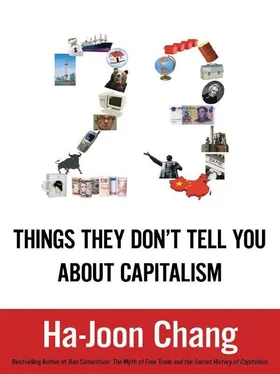Even if they have increased financial instability and job insecurity, policies aimed at increasing price stability may be partially justified, had they increased investment and thus growth, as the inflation hawks had predicted. However, the world economy has grown much more slowly during the post-1980s low-inflation era, compared to the high-inflation period of the 1960s and 70s, not least because investment has fallen in most countries ( see Thing 13 ). Even in the rich countries since the 1990s, where inflation has been completely tamed, per capita income growth fell from 3.2 per cent in the 1960s and 70s to 1.4 per cent during 1990–2009.
All in all, inflation, at low to moderate levels, is not as dangerous as free-market economists make it out to be. Attempts to bring inflation down to very low levels have reduced investment and growth, contrary to the claim that the greater economic stability that lower inflation brings will encourage investment and thus growth. More importantly, lower inflation has not even brought genuine economic stability to most of us. Liberalizations of capital and labour markets that form integral parts of the free-market policy package, of which inflation control is a key element, have increased financial instability and job insecurity, making the world more unstable for most of us. To add insult to injury, the alleged growth-enhancing impact of inflation control has not materialized.
Our obsession with inflation should end. Inflation has become the bogeyman that has been used to justify policies that have mainly benefited the holders of financial assets, at the cost of long-term stability, economic growth and human happiness.
Thing 7: Free-market policies rarely make poor countries rich
After their independence from colonial rule, developing countries tried to develop their economies through state intervention, sometimes even explicitly adopting socialism. They tried to develop industries such as steel and automobiles, which were beyond their capabilities, artificially by using measures such as trade protectionism, a ban on foreign direct investment, industrial subsidies, and even state ownership of banks and industrial enterprises. At an emotional level this was understandable, given that their former colonial masters were all capitalist countries pursuing free-market policies. However, this strategy produced at best stagnation and at worst disaster. Growth was anaemic (if not negative) and the protected industries failed to ‘grow up’. Thankfully, most of these countries have come to their senses since the 1980s and come to adopt free-market policies. When you think about it, this was the right thing to do from the beginning. All of today’s rich countries, with the exception of Japan (and possibly Korea, although there is debate on that), have become rich through free-market policies, especially through free trade with the rest of the world. And developing countries that have more fully embraced such policies have done better in the recent period.
Contrary to what is commonly believed, the performance of developing countries in the period of state-led development was superior to what they have achieved during the subsequent period of market-oriented reform. There were some spectacular failures of state intervention, but most of these countries grew much faster, with more equitable income distribution and far fewer financial crises, during the ‘bad old days’ than they have done in the period of market-oriented reforms. Moreover, it is also not true that almost all rich countries have become rich through free-market policies. The truth is more or less the opposite. With only a few exceptions, all of today’s rich countries, including Britain and the US – the supposed homes of free trade and free market – have become rich through the combinations of protectionism, subsidies and other policies that today they advise the developing countries not to adopt. Free-market policies have made few countries rich so far and will make few rich in the future.
Here are the profiles of two developing countries. You are an economic analyst trying to assess their development prospects. What would you say?
Country A : Until a decade ago, the country was highly protectionist, with an average industrial tariff rate well above 30 per cent. Despite the recent tariff reduction, important visible and invisible trade restrictions remain. The country has heavy restrictions on cross-border flows of capital, a state-owned and highly regulated banking sector, and numerous restrictions on foreign ownership of financial assets. Foreign firms producing in the country complain that they are discriminated against through differential taxes and regulations by local governments. The country has no elections and is riddled with corruption. It has opaque and complicated property rights. In particular, its protection of intellectual property rights is weak, making it the pirate capital of the world. The country has a large number of state-owned enterprises, many of which make large losses but are propped up by subsidies and government-granted monopoly rights.
Country B : The country’s trade policy has literally been the most protectionist in the world for the last few decades, with an average industrial tariff rate at 40–55 per cent. The majority of the population cannot vote, and vote-buying and electoral fraud are widespread. Corruption is rampant, with political parties selling government jobs to their financial backers. The country has never recruited a single civil servant through an open, competitive process. Its public finances are precarious, with records of government loan defaults that worry foreign investors. Despite this, it discriminates heavily against foreign investors. Especially in the banking sector, foreigners are prohibited from becoming directors while foreign shareholders cannot even exercise their voting rights unless they are resident in the country. It does not have a competition law, permitting cartels and other forms of monopoly to grow unchecked. Its protection of intellectual property rights is patchy, particularly marred by its refusal to protect foreigners’ copyrights.
Both these countries are up to their necks in things that are supposed to hamper economic development – heavy protectionism, discrimination against foreign investors, weak protection of property rights, monopolies, lack of democracy, corruption, lack of meritocracy, and so on. You would think that they are both headed for developmental disasters. But think again.
Country A is China today – some readers may have guessed that. However, few readers would have guessed that Country B is the USA – that is, around 1880, when it was somewhat poorer than today’s China.
Despite all the supposedly anti-developmental policies and institutions, China has been one of the world’s most dynamic and successful economies over the last three decades, while the USA in the 1880s was one of the fastest-growing – and rapidly becoming one of the richest – countries in the world. So the economic superstars of the late nineteenth century (USA) and of today (China) have both followed policy recipes that go almost totally against today’s neo-liberal free-market orthodoxy.
How is this possible? Hasn’t the free-market doctrine been distilled out of two centuries of successful development experiences by today’s two dozen rich countries? In order to answer these questions, we need to go back in history.
Dead presidents don’t talk
Читать дальше






![Ally Carter - [Gallagher Girls 01] I'd Tell You I Love You But Then I'd Have to Kill You](/books/262179/ally-carter-gallagher-girls-01-i-d-tell-you-i-lo-thumb.webp)





